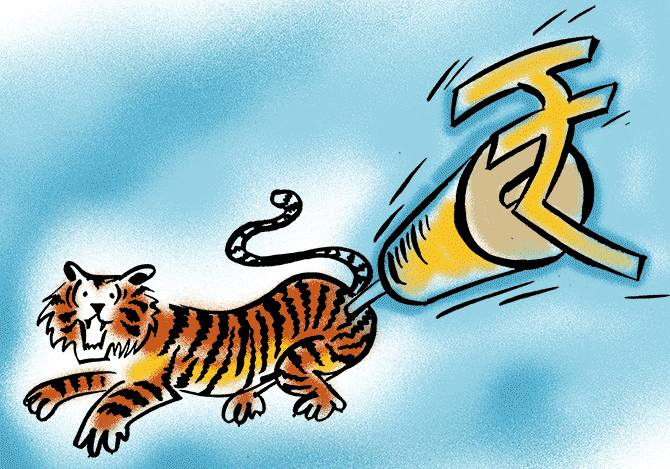With this subdued forecast, India is likely to record its worst growth performance since the 1991 liberalisation. However, it is among the only two major economies, which will register a positive growth rate in 2020. The other being China, for which the IMF has projected a growth rate of 1.2 per cent.

The IMF on Tuesday projected a GDP growth of 1.9 per cent for India in 2020, as the global economy hits the worst recession since the Great Depression in the 1930s due to the raging coronavirus pandemic that has nearly stalled all economic activities across the world.
With this subdued forecast, India is likely to record its worst growth performance since the 1991 liberalisation.
But the International Monetary Fund, in its latest edition of the World Economy report, has placed India as the fastest-growing emerging economies of the world.
It is among the only two major countries, which will register a positive growth rate in 2020.
The other being China, for which the IMF has projected a growth rate of 1.2 per cent.
"We project global growth in 2020 to fall to -3 per cent.
“This is a downgrade of 6.3 percentage points from January 2020, a major revision over a very short period," Indian--American Gita Gopinath, IMF chief economist said, adding that the COVID-19 pandemic will severely impact growth across all regions.
The Great Depression was the worst worldwide economic downturn that lasted for 10 years from 1929, beginning in the US when the New York Stock Exchange on Wall Street crashed and wiped out millions of investors.
Most countries, in the advanced economy group, are forecast to contract this year, including the United States (–5.9 per cent), Japan (–5.2 per cent), the United Kingdom (–6.5 per cent), Germany (–7.0 per cent), France (–7.2 per cent), Italy (–9.1 per cent), and Spain (–8.0 per cent), the IMF report said.

Even with a sharp rebound in the remainder of the year and sizable fiscal support, the Chinese economy is projected to grow at a subdued 1.2 per cent in 2020.
The IMF said several economies in the region were forecast to grow at modest rates, including India (1.9 per cent) and Indonesia (0.5 per cent), and others are forecast to experience large contractions (Thailand, –6.7 per cent).
The IMF said that other regions are projected to experience severe slowdowns or outright contractions in economic activity, including Latin America (–5.2 per cent) — with Brazil's growth forecast at –5.3 per cent and Mexico's at –6.6 per cent; emerging and developing Europe (–5.2 per cent) with Russia's economy projected to contract by –5.5 per cent.
The Middle East and Central Asia (–2.8 per cent) with Saudi Arabia's growth forecast at –2.3 per cent, with non-oil GDP contracting by four per cent, and most economies, including Iran, expected to contract; and sub-Saharan Africa (–1.6 per cent) with growth in Nigeria and South Africa expected at –3.4 per cent and –5.8 per cent respectively.
This is a crisis like no other, and there is substantial uncertainty about its impact on people's lives and livelihoods, Gopinath said.
A lot depends on the epidemiology of the virus, the effectiveness of containment measures, and the development of therapeutics and vaccines, all of which are hard to predict.
In addition, many countries now face multiple crises - a health crisis, a financial crisis, and a collapse in commodity prices, which interact in complex ways, she said.
Assuming the pandemic fades in the second half of 2020 and that policy actions taken around the world are effective in preventing widespread firm bankruptcies, extended job losses, and system-wide financial strains, Gopinath said the IMF projects global growth in 2021 to rebound to 5.8 per cent.
India's growth rate in 2021 is projected at 7.4 per cent, while that of China at 9.2 per cent.
The United States has been projected to grow at 4.5 per cent and Japan 3 per cent, the IMF report said.
This is a truly global crisis as no country is spared, Gopinath said.
Countries reliant on tourism, travel, hospitality, and entertainment for their growth are experiencing particularly large disruptions, she added.
The emerging markets and developing economies face additional challenges with unprecedented reversals in capital flows as global risk appetite wanes, and currency pressures, while coping with weaker health systems, and more limited fiscal space to provide support.
Moreover, several economies entered this crisis in a vulnerable state with sluggish growth and high debt levels, the IMF chief economist wrote.
According to the World Economic Report, the rebound in 2021 depends critically on the pandemic fading in the second half of 2020, allowing containment efforts to be gradually scaled back and restoring consumer and investor confidence.
Significant economic policy actions have already been taken across the world, focused on accommodating public health care requirements, while limiting the amplification to economic activity and the financial system.
The projected recovery assumes that these policy actions are effective in preventing widespread firm bankruptcies, extended job losses, and system-wide financial strains, it said.
India is likely to record its worst growth performance since the 1991 liberalisation this fiscal year as the coronavirus outbreak severely disrupts the economy, the World Bank said on Sunday.
India's economy is expected to grow 1.5 per cent to 2.8 per cent in the 2020-21 fiscal which started on April 1, the World Bank said in its South Asia Economic Focus report.
It estimated India will grow 4.8 per cent to 5 per cent in the 2019-20 fiscal that ended on March 31.











 © 2025
© 2025